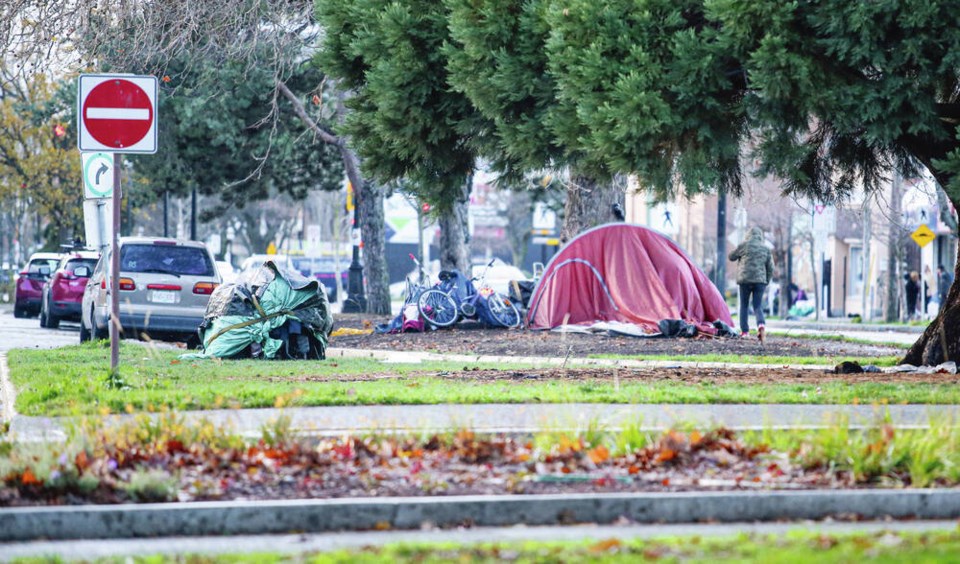Advocates worry staffing shortages at shelters could leave people out in the rain and cold with dire consequences, as a period of wet weather is set to begin.
Nicole Chaland, a housing and homelessness advocate, helped support a man who had been sleeping in a park during a storm that brought heavy rain and flood damage in mid-November, and told her he “couldn’t get the chill out of his bones.”
The man was able to find a shelter mat to sleep indoors, but was left to wander during the day with his belongings until the evening, when the shelter reopened. He tried to take his own life recently, Chaland said.
“He just said several times, he can’t go through this again. He’s got kind of a long history of homelessness. But he can’t go through it again, so I don’t think it’s hyperbole to say people are going to die if they can’t staff up these places,” she said.
It remains uncertain when service organizations that typically open their doors during extreme weather events starting Nov. 1 will be ready, because they’re having trouble finding the staff they need.
The goal is to make additional spaces available when weather conditions present a “substantial threat to the life or health of homeless persons,” such as temperatures at or near zero, rainfall that makes it difficult for people to remain dry, and during sleet, freezing rain, accumulating snow or sustained high winds.
Kelly Roth, executive director of the Greater Victoria Coalition to End Homelessness, said about 30 mats are expected to be available overnight soon at the Salvation Army in case of extreme weather, as long as the organization can hire sufficient staff.
“I’m expecting … that we are going to be able to have that response in place. I can’t say that for certain right now,” Roth said.
Although rain is in the forecast for Victoria in the next few days, with temperatures above zero, it’s not certain if the extreme weather protocol would be triggered.
Rachel Phillips, executive director of PEERS Victoria Resource Society, estimates 100 to 200 people are living outside in “really unsafe circumstances.”
“Can you imagine trying to sleep out in some of the weather that we’ve had? And on top of that having health vulnerabilities maybe related to substance use or mental health or chronic diseases,” she said.
Phillips said it’s difficult to find staff available to work on short notice and overnight, and new shelter housing opened in the past year has stretched the existing workforce.
“The staffing shortage is actually kind of scary, because I think we all would like to be doing more,” she said.
Roth said it has always been challenging to get the extreme weather shelters ready to open, but pandemic burnout in frontline workers is complicating the situation. Already an issue before the pandemic, burnout is increasing as the province drug toxicity deaths hit record levels.
Last year, Victoria’s extreme weather protocol didn’t operate, as the shelter beds that typically open during cold or wet weather were already in use in response to the pandemic.
“So we’re asking a lot of our homelessness response sector to be able to continue to step up and lean into this, and to their credit, that’s what’s still happening,” Roth said.
Organizations are seeking people who are available for on-call and casual work and are non-judgmental, familiar with the issue of homelessness and trauma-informed communication and able to foster a calm environment. A short training on overdose prevention will be provided for casual staff.
In previous years, extreme weather protocols have activated nighttime spaces only, but this year, the City of Victoria is organizing daytime warming centres with provincial funding.
The city has confirmed two daytime locations, James Bay United Church and the Salvation Army, that will be available when the extreme weather protocol is activated, and are exploring other potential sites. They’re looking to hire 20 auxiliary positions to prepare those spaces in the event of extreme weather.
Those sleeping outdoors would be in a better position to cope with poor weather if they were allowed to keep their tents up 24/7 like last winter, Phillips said, but Victoria has resumed enforcement of a bylaw that requires people to take down their structures each morning.
“It does make it complicated for people’s safety and for outreach workers to offer support.”
Niki Ottosen, who runs the Backpack Project supplying unhoused people with tents and warm clothing, said for the past couple of months, she has been unable to find in any local stores the $50 tents she normally buys.
“People are really struggling and suffering right now, and all I can do is offer them tarps,” she said.



